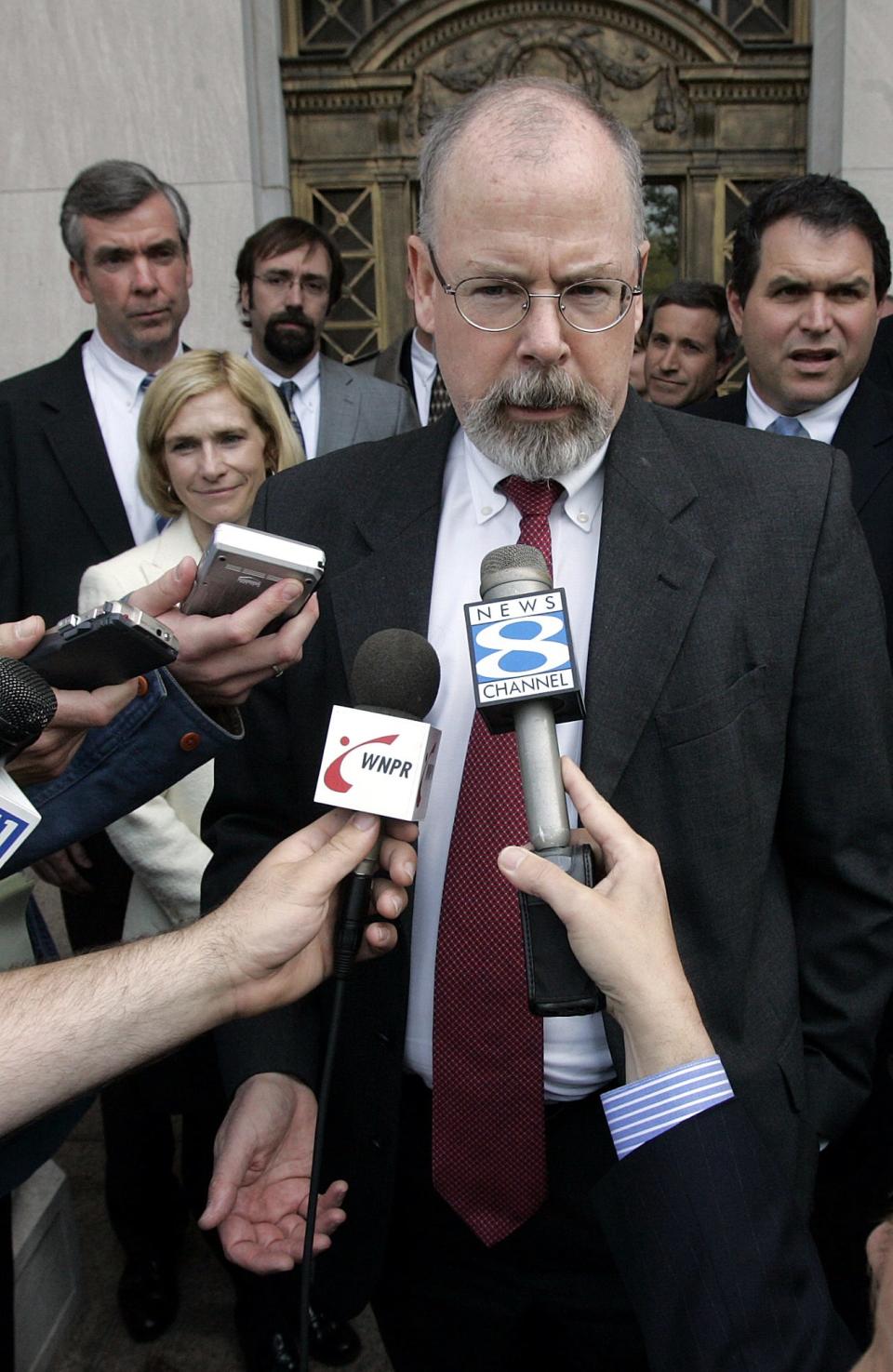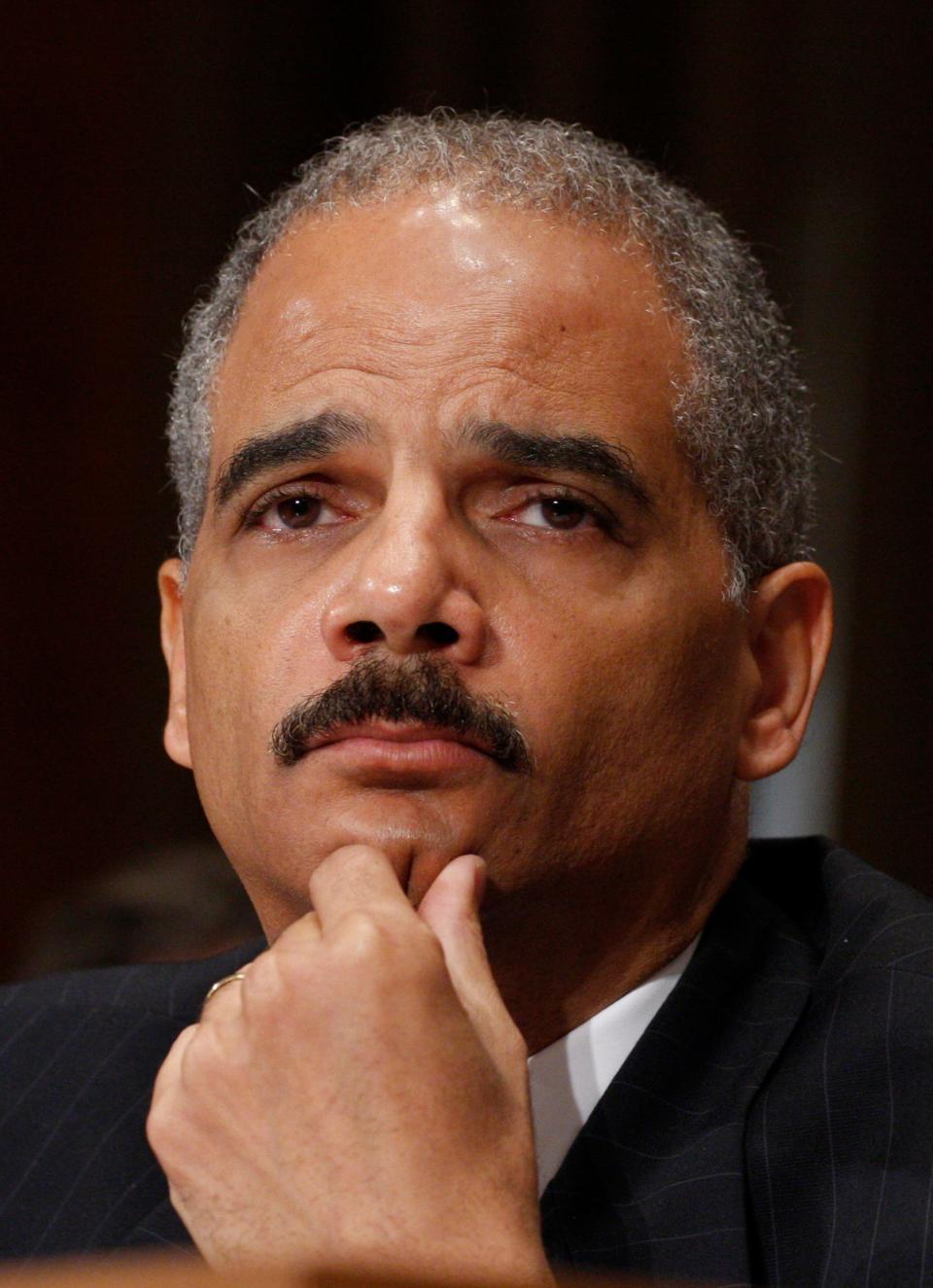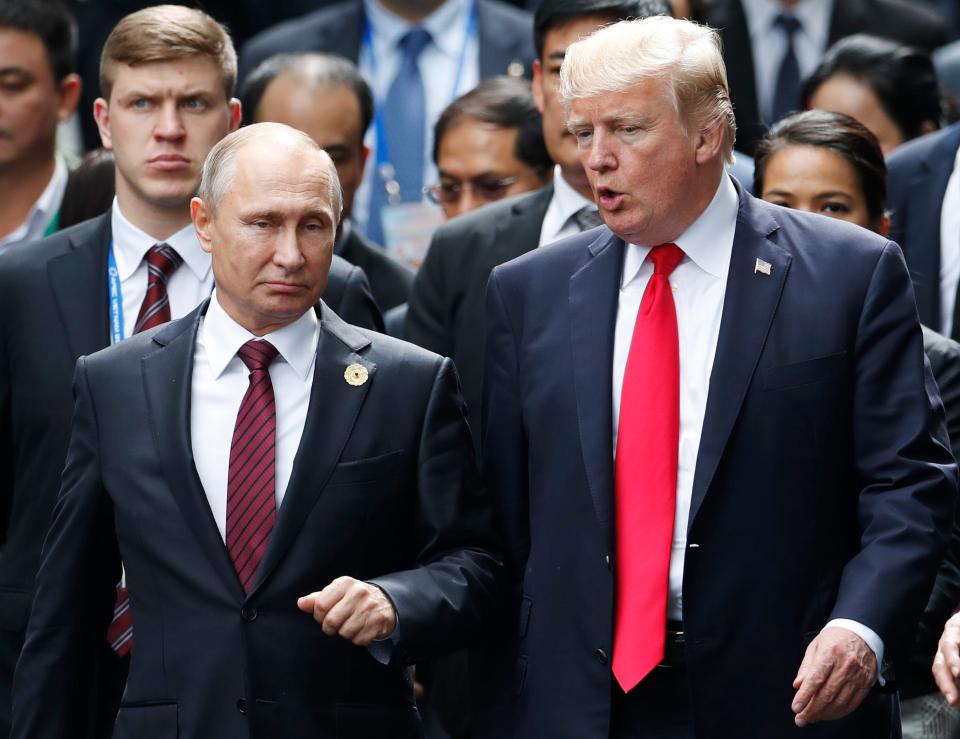John Durham continues investigating 2016 campaign and Trump, Russia accusations. What has he found?
- Oops!Something went wrong.Please try again later.
- Oops!Something went wrong.Please try again later.
- Oops!Something went wrong.Please try again later.
- Oops!Something went wrong.Please try again later.
- Oops!Something went wrong.Please try again later.
WASHINGTON – Special counsel John Durham drew the spotlight recently with a hotly contested court filing that sparked allegations of spying on former President Donald Trump, but it also revived questions about what he’s been doing during his nearly three-year investigation.
His probe began as a review of what sparked the FBI investigation of Russian interference in the 2016 election. The inquiry has grown to engulf some of the most contentious aspects of the campaign between Trump and Hillary Clinton.
Durham's probe of the 2016 election is now far longer than the 22-month investigation by special counsel Robert Mueller into Russian interference in the campaign. So far, Durham has charged three people, each for allegedly lying to or for the FBI, which prompted Trump and lawmakers to question what he has been doing. Throughout the probe, Durham has kept a low profile and revelations in court documents provide few clues about where the investigation is headed.
Durham's statements and legal filings occasionally spark criticism. In one pending case that's drawn fierce reaction from conservatives, Durham argued in a February court filing that a tech executive mined internet data related to Trump Tower, a Trump apartment building and the executive office of the president. Trump and right-wing publications called it proof Clinton spied on him.
But the reason for the filing was the ho-hum subject of whether lawyers for the defendant, Michael Sussmann, had a conflict of interest in the case. Sussmann said he was aware of the potential conflict and would continue with the same lawyers.
But his lawyers called the allegations irrelevant to the charge against him and false, “plainly intended to politicize this case, inflame media coverage, and taint the jury pool.”
“This particular dustup strikes me as a sideshow," U.S. District Judge Christopher Cooper told prosecutors March 10.
Sussmann was acquitted May 31 of the charge after a jury trial.
More: AG Garland: Justice does not 'shy away' from controversial Jan. 6 investigations
The flareup illustrated how opaque special counsel investigations are until charges are filed.
“I can’t imagine the circumstances which would have required taking that long, which in turn lends itself to the appearance that it might be politically motivated or politically driven,” said Bruce Udolf, a criminal defense attorney in Florida who served as an associate independent counsel investigating President Bill Clinton in the 1990s over a land deal in Arkansas. “It makes it sound like it was an investigation in search of a crime."
Paul Rosenzweig, a former senior counsel to independent counsel Kenneth Starr’s investigation of Bill Clinton, said clues about which way an investigation is headed are often revealed through public records such as subpoenas or court filings. He said the lack of announcements about subpoenas might suggest little activity in the probe.
“We’ve seen very little of that, which suggests to me a relatively lower amount of activity in the Durham sphere,” said Rosenzweig, founder of Red Branch Consulting, which deals with homeland security and data privacy.
Public revelations have been rare. Lawmakers want to know what the probe has found. Even Trump issued a statement more than a year ago, questioning the pace.
“Where’s Durham?” Trump asked March 6, 2021. “Is he a living, breathing human being? Will there ever be a Durham report?”

Special counsel investigations can take a while
Durham was tasked with leading a special counsel investigation of what started another special counsel investigation: the Mueller investigation.
The attorney general can appoint a special counsel, or the predecessor post called independent counsel, to investigate potential criminal activity outside the typical Justice Department hierarchy to ensure it is free of interference from an administration.
In Durham's case, Trump argued that the FBI and Mueller investigations of his administration were inappropriate.
Such special investigations can take years. Starr spent five years investigating Clinton and independent counsel Lawrence Walsh spent nearly seven years investigating the Iran-Contra affair during the Reagan administration. Durham spent $2.8 million during his first year as special counsel ending in September, the most recent period available. For comparison, Mueller's investigation cost about $16 million.
Rosenzweig compared special counsels to Inspector Javert, the fictional police officer in Victor Hugo’s “Les Miserables,” who pursues a suspect for years.
“Sometimes they get a bit of a Javert quality to them,” Rosenzweig said. “But these things tend to linger and they tend to linger because as a good special counsel, they feel like they need to be thorough."
More: Biden administration asks Trump-appointed U.S. attorneys to resign — but not Durham
Former Attorney General William Barr directed Durham in May 2019 to review allegations about investigations of the 2016 presidential campaign. Based on initial findings, Barr appointed Durham in October 2020 to investigate whether anyone violated the law for intelligence gathering or law enforcement activities involving Trump, Mueller or the FBI investigation called Crossfire Hurricane into whether Trump's campaign coordinated with Russian efforts to interfere in the election.
Barr authorized Durham to prosecute federal crimes if necessary and submit a final report suitable for public release to the attorney general when the probe is concluded. But Barr set no deadline for completing the probe.

Durham respected as career prosecutor of mafia, corruption
Durham has pursued high-profile, difficult investigations for much of his 45-year career as a prosecutor. The assignments have come from Democratic and Republican administrations, and he's won praise from both for his thoroughness, whether they yielded headline-grabbing convictions or no charges at all.
During the 1980s, Durham joined a Boston strike force fighting organized crime, where he prosecuted members of the Genovese, Gambino and Patriarca crime families.
In the late 1990s, then-Attorney General Janet Reno appointed Durham to lead a task force investigating corrupt law enforcement officers associated with the Winter Hill Gang in Boston. Former FBI Supervisory Agent John Connolly and former Massachusetts State Police Lt. Richard Schneiderhan were convicted of feeding confidential police information to criminals James “Whitey” Bulger and Stephen “The Rifleman” Flemmi.
In 2004, then-Connecticut Gov. John Rowland was indicted for theft of government services. Durham supervised the negotiations that led to his guilty plea and spending one year in prison.
Then-Attorney General Michael Mukasey asked Durham in 2008 to investigate the CIA destruction of videotapes of detainee interrogations after the terror attacks of Sept. 11, 2001. Then-Attorney General Eric Holder expanded the investigation in 2009 to cover whether interrogation techniques violated the torture statute.
Durham reviewed the interrogation of 101 detainees and recommended in 2011 the full criminal investigation of two individuals who died in custody. But Holder closed the investigation in 2012 without charges.
Holder commended Durham and his team for working “tirelessly to conduct extraordinarily thorough and complete” investigations.

Durham is famously taciturn. “He’s notoriously shy about speaking about himself or what he does,” said Leonard Boyle, a longtime fellow prosecutor who introduced Durham for a rare speech in March 2018.
In that speech, Durham acknowledged the power that prosecutors wield and said it must be used appropriately.
“Issuing a subpoena, we can destroy somebody’s reputation, we can damage their business, we can hurt their families,” Durham said at the University of St. Joseph in West Hartford, Connecticut. “This flies a little bit in the face of the constant demand that the public has for information.”

Durham was tapped to lead divisive probe of Crossfire Hurricane
Durham's latest assignment is a politically fraught probe, with officials on all sides invested in the outcome. His review ran parallel to a Justice Department inspector general's probe, signaling a lack of trust from the administration.
"Spying on a campaign is a big deal," Barr told a Senate panel in April 2019. "I think spying did occur," Barr added, though he questioned whether there was enough evidence to justify the surveillance.
Michael Horowitz, the inspector general, issued a scathing report in December 2019 that criticized how the FBI won court orders to wiretap Carter Page, a Trump campaign adviser.
Former FBI lawyer Kevin Clinesmith pleaded guilty as part of Durham's review to falsifying an email used to support the surveillance of Page.
More: Politics live updates: Garland aims to 'turn down the volume' at Justice Department
But Horowitz rejected Trump’s accusations that FBI leaders were trying to sabotage his campaign.
“We did not find documentary or testimonial evidence that political bias or improper motivation influenced” the decision to wiretap Page, the 478-page report said.
Durham issued a rare statement Dec. 9, 2019, disputing Horowitz's report without specifying the disagreements. While the investigation continued, Durham said "last month we advised the Inspector General that we do not agree with the some of the report's conclusions."
Senate Majority Leader Chuck Schumer, D-N.Y., slammed Durham the next day for what he called a political statement serving as "a henchman of Mr. Barr" rather than as a "dispassionate, nonpolitical observer."
The intelligence community concluded Russia exerted influence during the campaign to help Trump, but not that his campaign colluded with Russia.
What was the Steele dossier?
Another contentious facet of the 2016 campaign was known as the Steele Dossier. Former British intelligence officer Christopher Steele compiled the report as opposition research about Trump’s connections to Russia for the Clinton campaign.
Steele passed along the report to the FBI. But many of the anonymous allegations were debunked and Trump dismissed it as “fake news.”
One of the men Durham charged is Igor Danchenko, a Russian citizen living in Virginia, who allegedly provided material for Steele’s report. Danchenko, who pleaded not guilty, was charged in November and faces trial in October on five counts of making false statements to the FBI.
Rosenzweig characterized charges against Danchenko and Sussmann as peripheral to Durham's investigation.
“The two charges are clearly very derivative charges about lying to people during the course of activities, not the primary offenses," Rosenzweig said. "Both of them, by any stretch of the imagination, are peripheral to the gravamen of the ultimate charge or what he is supposed to be investigating."

Sussman filing sparks attention, criticism
Durham generated more headlines in the case against Sussmann, a national security lawyer, who served as counsel to Clinton’s campaign. The indictment alleges Sussman told the FBI he wasn’t providing the tip “on behalf of any client,” such as the Clinton campaign. But his lawyers contended he “did not make any false statement to the FBI."
Sussman had met Sept. 16, 2016, with FBI general counsel James Baker to offer a tip alleging a secret channel of communications between the Trump Organization and a Russian bank. Sussman also met Feb. 9, 2017, with CIA officials to discuss Trump.
A flurry of coverage followed a Durham filing Feb. 11 arguing Sussmann’s lawyers had a conflict of interest. To bolster the case, the filing described an unnamed tech executive mining internet data from Trump Tower, a Trump apartment building in New York and the executive office of the president.
Fox News, the New York Post and Washington Examiner each reported the filing was evidence the Clinton campaign was spying on Trump as a candidate and as president.
Trump, who wrongly called the special counsel "Robert Durham" in a statement, said the filing “provides indisputable evidence that my campaign and presidency were spied on by operatives paid by the Clinton Campaign in an effort to develop a completely fabricated connection to Russia.” He suggested the crime could be “punishable by death.”
But Sussmann’s lawyers said the document contained false allegations irrelevant to the charge in the case. The February 2017 meeting dealt with data from when Barack Obama was president, the lawyers said. Prosecutors haven’t charged the tech executive.
Andrew DeFilippis, an assistant U.S. attorney prosecuting the case, told the judge at the March 10 hearing the information was included to "be extra careful" and there was no need to clarify or correct the record.
"We don’t want to enter that game of correcting misinterpretations that may be out there," DeFilippis said. "We are being very careful to be accurate with the court."
Cooper, the judge presiding over the case, told prosecutors the tech allegations weren't necessary because he could have simply asked Sussmann about the potential conflict at a routine hearing, as he did that day. He reminded prosecutors their arguments "are under a microscope" and would draw publicity in the high-profile case.
“Until we swear a jury in this case, you folks have an audience of one," Cooper said. "That’s me."
This article originally appeared on USA TODAY: John Durham investigation of 2016 campaign continues. What's he done?

